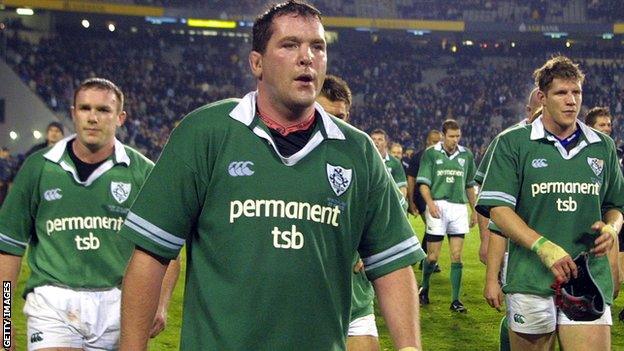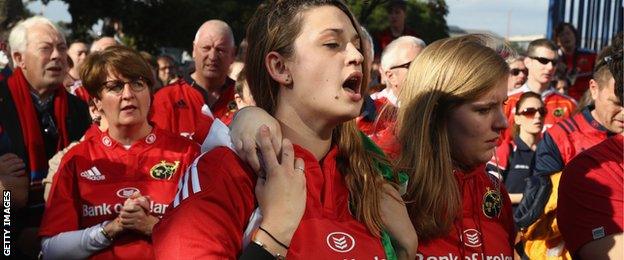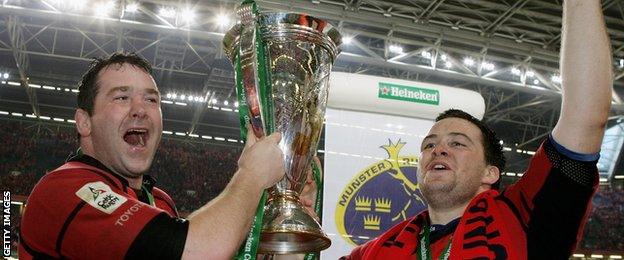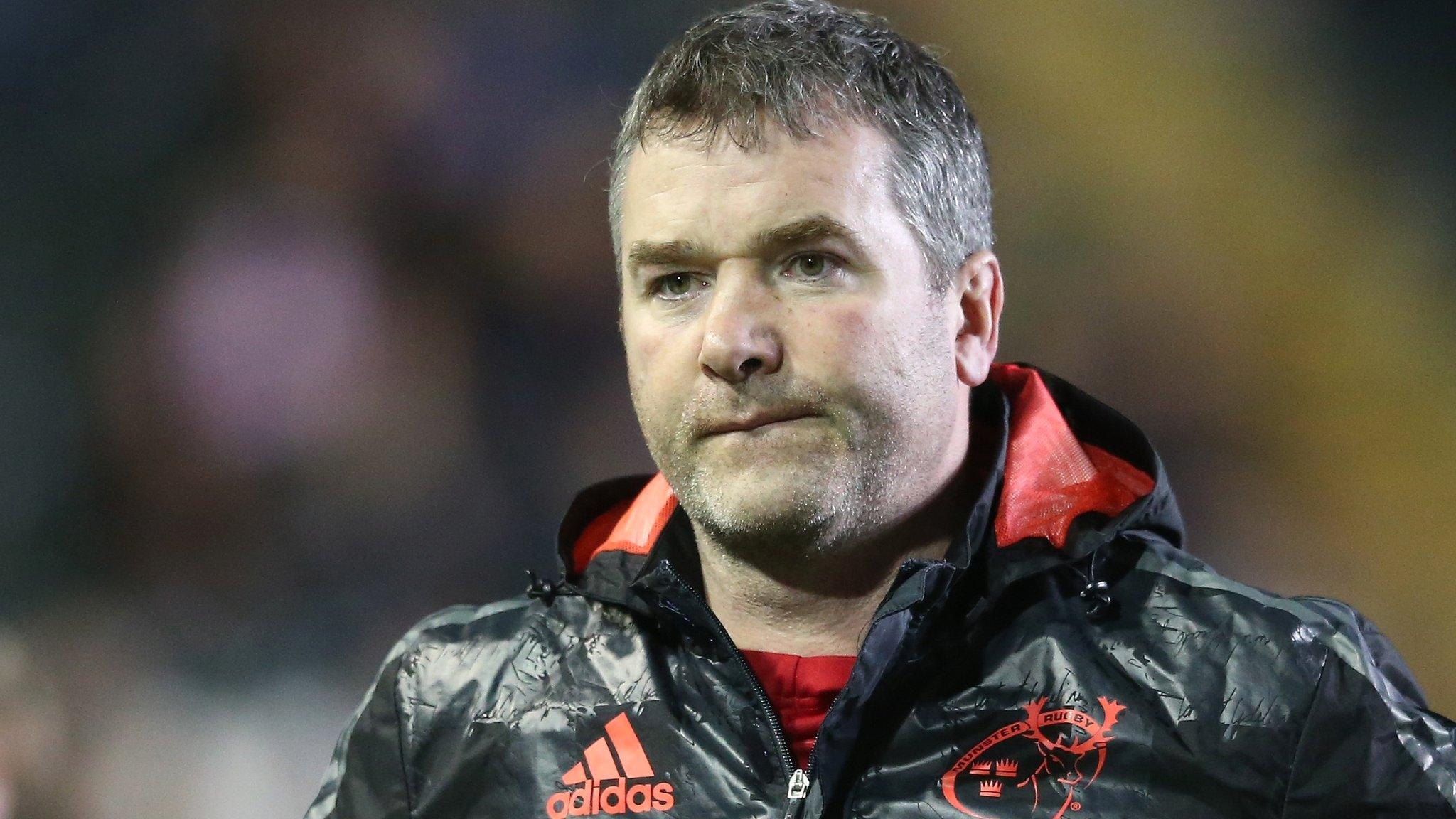Anthony Foley: Munster coach's death an 'outrageous loss'
- Published

Anthony Foley (centre) scored five tries in 62 Tests for Ireland
Anthony Foley once described rugby as, basically, "a street fight with a ball".
He said that a rugby player has many ways to score a try but the route he so often chose was the shortest route: "Straight over a fella. Sometimes you need to run at people rather than around them - you need to put a bit of manners on them."
Foley - or Axel to his mates - died suddenly on Sunday in Paris and the game in Ireland, and beyond, is going to take some time to try to comprehend this outrageous loss.
When the news broke you thought of his family, of course. You thought of all those people at his beloved Shannon RFC, where it all started for him. You thought of his legion of fans at Munster, who hold him up as one of their greatest and most influential sons.
The numbers of his playing career are impressive - 201 appearances for Munster and 62 Tests for his country, 86 European ties, three European finals, three semi-finals.
No list of his accomplishments would be complete without cataloguing the five All Ireland League titles he won with Shannon. Those victories meant as much to him as anything. Hard rugby played in front of passionate rugby people. This was where Foley was at his happiest. It was what Foley was born to do.
And yet the number that jumped out at you on this grim day was 42 - his age. It's no age.
He had taken his first steps in coaching with Munster - he was head coach and in Paris for Munster's opening fixture of the Champions Cup against Racing 92 - and though he had a lot to learn, the story of his playing career told you emphatically that one day he would learn it all and achieve greatness as a coach, too.
Anthony Foley: Ex-Ireland team-mate Denis Hickie pays tribute to 'Munster's rock'
Ten years ago he wrote: "If I'm going to be remembered I'd like to be seen as a stubborn player, somebody who wouldn't give in. There were times during my career when I could have called it quits and gone off and done other things - but there was always a goal there, always something to achieve.
"Once there's something to chase, I'll chase it."
Foley underplayed his ability. For sure, he was a stubborn back-row forward, a number eight that would never take a backward step for anybody. But he was intelligent. His reading of rugby games was extraordinary at times.
"The smartest rugby player I have ever had the honour of playing with or against," said Keith Wood, the former Ireland captain and Foley's boyhood friend.

Former Australia captain Michael Lynagh

Former England forward Martin Corry
It was easy to see where Foley got it from. He was born into a rugby family - or more particularly, a Shannon family.
Shannon people will tell you there's a difference. They'll say there's no rugby family is like a Shannon rugby family - and therein lies the beauty of rugby in Limerick because Young Munster people say the same thing about themselves, as do those in Garryowen, Old Crescent, Bohemians and many other clubs in this rugby-mad city.
Foley loved the intercity rivalry. It was bred into him.
Long before he brought his uncompromising will to the Shannon and Munster dressing room, his father had done it already.
Brendan Foley did not have a lot as a kid, but what he had was a devotion to the game, a hunger to become good at it and an ability to pass on its joys to his son and daughter, Rosie, who won 39 caps for the Ireland women's team.
"As a small boy I was sent to games with him," Foley recalled. "I carried his bag into the changing room at Thomond Park [Shannon's and Munster's home ground] and I minded the spot where he used to tog out - I was very protective of it."

Munster fans, who gathered in Paris after hearing news of Foley's death, sang Munster anthem Fields of Athenry in his honour
When Foley started playing for Munster in October 1994, he sat in the same spot where his father had sat.
He excelled. He was never the quickest or most athletic back-row forward - far from it - but he had, in Wood's words, "a sixth sense, an uncanny ability to be in the right place at the right time".
He flitted in and out of the Ireland team over the years, a succession of coaches unappreciative of his qualities. In Munster, they loved him unconditionally.
His leadership was legendary. When Munster suffered a setback he'd tell his team-mates to stick the memory of the loss into what he called the "bitterness bank". He used bitterness in a big way. They still use it now at Thomond Park.

Foley celebrates Munster's 2006 Heineken Cup win over Biarritz with team-mate Marcus Horan (right). He had lost in the final in 2000 and 2002.
At the beginning of the European Cup in 1995, Munster were an irrelevance. Their form in their bear pit in the middle of Limerick tended to be thunderous and many big wins were achieved, but there was no consistency, no apparent hope of them achieving anything.
The Foleys and the Mick Galweys and the Peter Clohessys - the Munster totems - drove the team forward. Foley instilled his principles into the new wave - Alan Quinlan, David Wallace, Ronan O'Gara, Peter Stringer, John Hayes, Paul O'Connell, Donncha O'Callaghan.
A team in Foley's own image had been created.
Munster made the Heineken Cup final in 2000 and 2002, losing both. They made the semi-finals in 2001, 2003 and 2004 and lost them, too. People in the province wondered if they would ever achieve their ultimate goal.
Foley never wondered or never had thoughts of surrender. He drove on, as honest and ferocious as ever.
In the 2006 Heineken Cup final he captained the team to victory against Biarritz, external at Cardiff's Millennium Stadium and wrote his name in Munster history just as his father did when playing in the side that beat the All Blacks at Thomond Park 28 years earlier in the most storied Irish rugby game of them all.
His loss is profoundly shocking. His list of achievements is long, but nowhere near as lengthy as the queue of people who wish to explain what he did and what he meant.
- Published16 October 2016

- Published25 March 2018